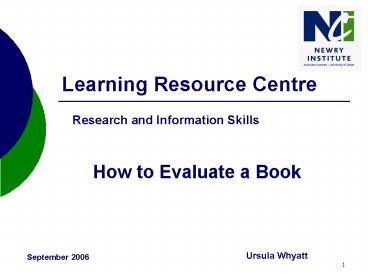Learning Resource Centre - PowerPoint PPT Presentation
1 / 12
Title:
Learning Resource Centre
Description:
Does it give a sequence of historical events or the results of lengthy ... Provide 'wrong' information that can be challenged or disagreed with productively ... – PowerPoint PPT presentation
Number of Views:61
Avg rating:3.0/5.0
Title: Learning Resource Centre
1
Learning Resource Centre
- Research and Information Skills
How to Evaluate a Book
Ursula Whyatt
September 2006
2
To evaluate a book look for Purpose Why
was the book written?
- For Example
- To inform? Does it give a sequence of historical
events or the results of lengthy study or
experiment? - To persuade? To change point of view, outlook,
beliefs, or behaviour - To entertain? Most fiction, humour, gossip
- To teach how to do something? CVs, cover
letters, business plans, needlework, woodwork
etc. - To give an overview? Textbooks, reference works
3
To evaluate a book look for Publisher Who
published the book?
- A university press?
- Commercial publisher?
- Professional or Trade Association, Institution,
or Research Centre? - Government
4
To evaluate a book look for Organization and
Content
- Examine the Table of Contents and/or
- headings to determine if the book is
- organized in a logical manner. Do the
- contents indicate that the book
- contains the information you need? Is
- there added material such as
- appendices?
5
To evaluate a book look for Date of Publication
- Some topics, for example multimedia, require
current information. Other subjects, such as
history, value older material as well as current.
Know the time needs of your topic and examine the
currency of information in the book. Is it - Up-to-date,
- Out-of-date, or
- Timeless?
6
To evaluate a book look for Authority/author
- Is the author a recognised expert in this field?
Where is the author employed? What else has
he/she written?
7
To evaluate a book look for Bibliography
- Scholarly works always contain a bibliography of
the - resources that were consulted. The references in
the - bibliography should be in sufficient quantity and
be - appropriate for the content. Look for
- If a bibliography exists,
- If the bibliography is short or long,
- If the bibliography is selective or
comprehensive, - If the references are primary sources (e.g.
historical documents) or only secondary sources
(e.g. encyclopaedias), - If the references are contemporary to the book or
much older, and - If the citation style is clear and consistent.
8
To evaluate a book look for Usefulness
- Is the book relevant to your current
- research project? A well-researched, well-written
- book is not going to be helpful if it does not
address - the topic at hand. Ask, "is this book useful to
me"? - If it is useful, does it
- Support an argument
- Refute an argument
- Give examples (survey results, primary research
findings, case studies, incidents) - Provide "wrong" information that can be
challenged or disagreed with productively
9
To evaluate a book look forCoverage
- Does the book cover the topic comprehensively,
partially or is it an overview?
10
To evaluate a book look forAudience
- For what type of reader is the author
- writing? Is the level of the book
- appropriate for your needs? Is the book for
- General readers,
- Students (secondary school, FE, university,
graduate), - Specialists or professionals,
- Researchers or scholars?
11
To evaluate a book look forIllustrations
- Are charts, graphs, maps, photographs, etc. used
to illustrate concepts? Are the illustrations
relevant? Are they clear and professional looking?
12
Learning Resource Centre
- Research and Information Skills
How to Evaluate a Book
Ursula Whyatt
September 2006

